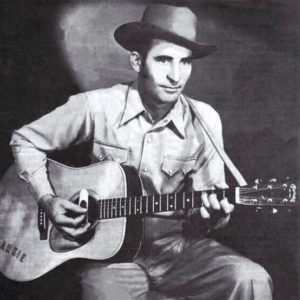calsfoundation@cals.org
Jesse Lee "Arkie" Shibley (1914–1975)
Jesse Lee “Arkie” Shibley was a country singer best known for recording the original version of “Hot Rod Race” in 1950. The song is included in the book What Was the First Rock ‘n’ Roll Record? as one of fifty recordings that were influential in the origination of rock and roll. According to authors Jim Dawson and Steve Propes, its importance lies in the fact that “it introduced automobile racing into popular music and underscored the car’s relevance to American culture, particularly youth culture.”
Jesse Lee Shibley was born on September 21, 1914, in Van Buren (Crawford County) to David M. and Prudie Shibley, both farmers. He was a cattle farmer himself and, on November 25, 1935, married Evelyn Marie Breeden; they had three children. The following year, he relocated to Bremerton, Washington, where he helped build the Illahee State Park by day and played swing country by night. Self-taught on guitar, Shibley assembled a group of musicians in the mid-1940s who would stay with him for almost a full decade: Leon Kelley (lead guitar), Phil Fregon (fiddle), Jackie Hayes (bass and banjo), and “Docie” Dean Manuel (piano). Calling themselves the Mountain Dew Boys, they made their first recordings for the obscure MaeMae label on the West Coast in the late 1940s. By that time, Shibley had moved to California, where “Arkie” was a common nickname for immigrants from Arkansas.
In 1950, Shibley was offered a song called “Hot Rod Race,” written by George Wilson (not a pseudonym for Shibley, as has been suggested elsewhere). He took it to Bill McCall, owner of 4 Star Records in Pasadena, California, who turned him down. The experience was later related in Shibley’s recording “Arkie’s Talking Blues”: “So I went to 4 Star with a smile on my face / I had a little tune called Hot Rod Race / Bill McCall he said it was no good / I’d be better off cutting hard wood.”
Shibley then decided to form his own label, Mountain Dew Records, and released “Hot Rod Race” in November 1950. Sensing a potential hit, McCall had second thoughts about the song. He purchased the master and reissued “Hot Rod Race” on his own Gilt-Edge label. With McCall’s promotional machine behind the record, it sold spectacularly, peaking at number five on Billboard’s country charts in February 1951. However, there was strong competition from several cover versions on major labels by Ramblin’ Jimmie Dolan (Capitol), Red Foley (Decca), and Tiny Hill (Mercury). These were more polished than the original, with its occasional odd tempos and awkward verses. All three cover versions peaked at number seven on the country charts, with the Tiny Hill version also crossing over to the pop charts at number twenty-nine.
Shibley recorded four sequels to his hit, all in 1951 and all performed in a Woody Guthrie–like talking blues style. A variation on “Hot Rod Race” called “Hot Rod Lincoln” was a pop hit in versions by Charlie Ryan (rising to number thirty-three in 1960), Johnny Bond (number twenty-six, 1960), and Commander Cody and His Lost Planet Airmen (number nine, 1972).
Though Shibley has been ignored by most country music encyclopedias, his place in country and early rock and roll history is assured on the strength of “Hot Rod Race.” Its influence was immense, not only on rock and roll car songs like “Maybellene” by Chuck Berry and “Race With the Devil” by Gene Vincent, but also on the hot rod music from the early 1960s (the Beach Boys, Jan and Dean, the Hondells, etc.).
Shibley died on September 9, 1975, in Van Buren.
For additional information:
Dawson, Jim, and Steve Propes. What Was the First Rock ‘n’ Roll Record? Boston: Faber and Faber, 1992.
Dik de Heer
University of Leiden
The Netherlands
 “Arkie” Shibley
“Arkie” Shibley 




Comments
No comments on this entry yet.